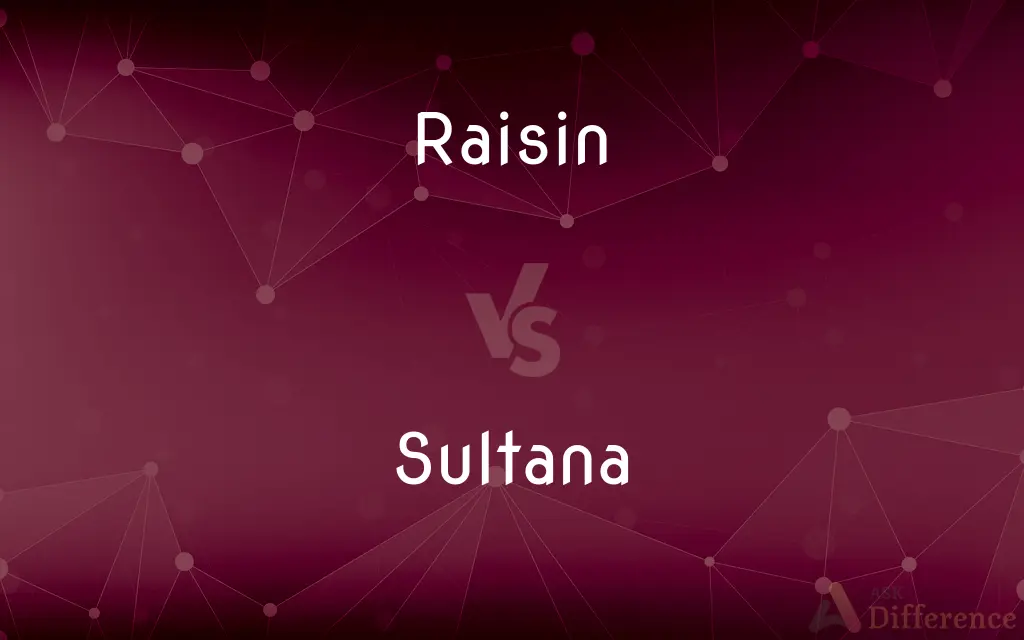Raisin vs. Sultana — What's the Difference?
By Urooj Arif & Maham Liaqat — Updated on April 25, 2024
A raisin is a dried grape, generally from larger grape varieties, whereas sultanas come from specific, smaller, seedless grapes, and are often lighter in color.

Difference Between Raisin and Sultana
Table of Contents
ADVERTISEMENT
Key Differences
Raisins are dried grapes that can come from a variety of grape types and are typically dark in color. They are known for their sweet flavor and are used in baking, cooking, and snacking. On the other hand, sultanas are specifically made from small, seedless, white (yellow or green) grapes, usually of the Thompson Seedless variety. Sultanas are also dried, but they are generally lighter in color, sweeter, and softer than most raisins.
When it comes to production, raisins can be sun-dried, shade-dried, or mechanically dried. This process leads to their dark color and shriveled texture. Whereas sultanas are often dipped in a solution before drying to accelerate the process, which preserves their lighter color and gives them a plumper appearance.
In culinary uses, raisins are versatile, used in a variety of dishes from oatmeal and cookies to savory dishes like tagines. Sultanas, due to their sweetness and tenderness, are particularly popular in baked goods, cereals, and as a snack on their own or in trail mixes.
Nutritionally, both raisins and sultanas are similar, offering a good source of iron, potassium, and certain antioxidants. However, the sweetness of sultanas might mean they contain slightly more sugars per serving compared to darker raisins.
Globally, raisins are more universally recognized and have a variety of regional types, such as Flame raisins, Golden raisins, or Black raisins. Sultanas, while popular in Europe and Australia, are often simply labeled as raisins in the United States, leading to some confusion.
ADVERTISEMENT
Comparison Chart
Grape Variety
Various types, often larger grapes
Specifically small, seedless white grapes
Color
Generally dark
Lighter, golden
Drying Process
Sun-dried, shade-dried, or mechanically dried
Often treated with a solution before drying
Texture
Firmer, shriveled
Softer, plumper
Use in Cooking
Versatile in both sweet and savory dishes
Preferred in sweet dishes like baked goods
Compare with Definitions
Raisin
A dried grape used in a variety of foods from snacks to meals.
She added raisins to her oatmeal for extra sweetness.
Sultana
Typically lighter in color and sweeter than other raisins.
Sultanas are preferred for their subtle sweetness in muffins.
Raisin
Produced by drying grapes either in the sun or using dehydrators.
Sun-dried raisins have a rich, intense flavor.
Sultana
Made from small, seedless Thompson Seedless grapes.
The Thompson Seedless grape is the primary source for sultanas.
Raisin
Used worldwide in different culinary traditions.
Raisins are key ingredients in Middle Eastern rice dishes.
Sultana
Often treated before drying to maintain a golden color.
Sultanas are dipped in a solution to keep their appealing light color.
Raisin
A naturally sweetened, shriveled fruit.
Raisins are a great addition to homemade granola.
Sultana
A type of dried white grape known for its sweet taste.
Sultanas are often used in festive fruitcakes.
Raisin
Available in several varieties depending on the grape used.
Golden raisins are made from specially treated grapes to preserve their color.
Sultana
Common in European and Australian cuisines.
In Europe, sultanas are a popular yogurt topping.
Raisin
A raisin is a dried grape. Raisins are produced in many regions of the world and may be eaten raw or used in cooking, baking, and brewing.
Sultana
A small, light brown, seedless raisin used in foods such as puddings and cakes
A sultana cake
Raisin
A partially dried grape.
Sultana
A wife or concubine of a sultan.
Raisin
A sweet grape dried either in the sun or by artificial means.
Sultana
The wife, mother, sister, or daughter of a sultan.
Raisin
A deep brownish purple.
Sultana
The mistress of a sultan.
Raisin
A dried grape.
Sultana
Any of various green seedless grapes, especially the Thompson seedless, used in producing raisins and a white wine.
Raisin
(intransitive) Of grapes: to dry out; to become like raisins.
Sultana
The often yellow raisin made from this grape.
Raisin
A grape, or a bunch of grapes.
Sultana
A pale yellow raisin made from a seedless grape.
Raisin
A grape dried in the sun or by artificial heat.
Sultana
A wife or mistress of a sultan.
Raisin
Dried grape
Sultana
A female ruler of a sultanate.
Sultana
A type of viol, a cither viol.
Sultana
An old form of necklace.
Sultana
The wife of a sultan; a sultaness.
Sultana
A kind of seedless raisin produced near Smyrna in Asiatic Turkey.
Sultana
Pale yellow seedless grape used for raisins and wine
Sultana
Dried seedless grape
Common Curiosities
What is the main difference between a raisin and a sultana?
The main difference is the type of grape used and the drying process, affecting their color and texture.
What are the best uses for sultanas in the kitchen?
Sultanas are excellent in baked goods, cereals, and as sweet snacks.
Do raisins and sultanas come from the same grape?
No, raisins can come from various grapes, whereas sultanas come specifically from small, seedless white grapes.
Are raisins and sultanas used differently in cooking?
Yes, raisins are versatile in both sweet and savory dishes, whereas sultanas are favored in sweet dishes.
Which is healthier, raisins or sultanas?
Both are similar nutritionally, but sultanas might have slightly higher sugar content.
How are raisins made?
Raisins are made by drying grapes naturally in the sun or using mechanical means.
Can raisins and sultanas go bad?
Yes, they can spoil if exposed to moisture or stored improperly.
Are sultanas sweeter than raisins?
Yes, sultanas are generally sweeter than other types of raisins.
What does it mean when raisins are "golden"?
Golden raisins have been treated with sulfur dioxide to preserve their color and are dried differently.
Can I substitute raisins for sultanas in recipes?
Yes, you can substitute them based on personal taste preferences; sultanas are sweeter and moister.
Are sultanas more expensive than raisins?
Typically, sultanas can be more expensive due to their processing and the type of grape used.
Why are sultanas often lighter in color?
Sultanas are treated with a solution before drying to preserve their light color.
Which is more popular globally, raisins or sultanas?
Raisins are more widely recognized and used globally compared to sultanas.
How should I store raisins and sultanas?
Both should be stored in a cool, dry place; airtight containers are best to preserve freshness.
Are there any seedless raisins?
Yes, some varieties of raisins, like some sultanas, are seedless.
Share Your Discovery

Previous Comparison
Enjoin vs. Join
Next Comparison
Terrier vs. BulldogAuthor Spotlight
Written by
Urooj ArifUrooj is a skilled content writer at Ask Difference, known for her exceptional ability to simplify complex topics into engaging and informative content. With a passion for research and a flair for clear, concise writing, she consistently delivers articles that resonate with our diverse audience.
Co-written by
Maham Liaqat













































